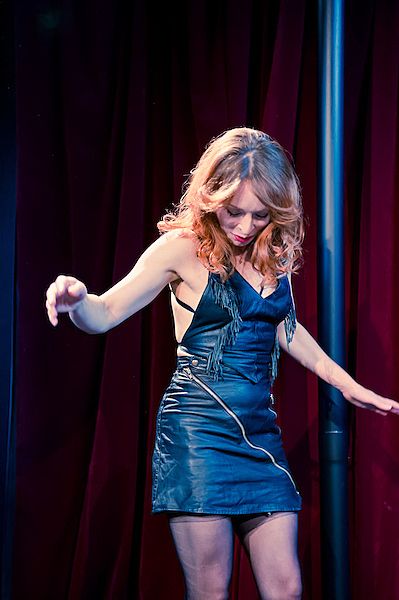Chaste Longue: A Review of Venus In Fur
Shannon Friday reviews the Circa Theatre production of Venus In Fur, a surprisingly coy adaptation of a steamy, brilliant script.
Shannon Friday reviews the Circa Theatre production of Venus In Fur, a surprisingly coy adaptation of a steamy, brilliant script.
Imagine, 150 years from now maybe, someone makes 50 Shades of Grey into a highbrow stage play. Now imagine someone making a play about someone making 50 Shades into a play. Now imagine someone using those nested frames to show all the slippery ways that sexual desire, status, and humiliation drive us in everyday life. That’s what David Ives is doing with Venus in Fur: complicating ideas of fantasy and power in an explicitly erotic way.
Ives’ play is tightly framed, bound to a single evening in a scuzzy rehearsal room on the outskirts of New York’s theatre scene. Thomas (Andrew Foster, who also directs) has adapted for the stage Leopold von Sacher-Masoch’s Venus in Furs, the novella that kicked off modern sado-masochism. In that novella, nebbish Herr Kushemski submits to and is humiliated by the mysterious and alluring Countess Vanda von Denajew before “earning” a relationship with her. Thomas, oblivious to his own desires as he channels them into the play, has adapted what is essentially 1870’s version of 50 Shades of Grey. In his high-art drama, Thomas has wrapped his own conflicted hunger and self-loathing in layers of safe intellectualized cotton wool.
After a long day of underwhelming auditions, Thomas, who Foster plays as a Marc Maron-esque misanthrope, bemoans the inability of every woman he’s seen to live up to his expectations. Gazing at a board with dozens of perfectly posed headshots, he complains bitterly that all he wants is “a sexy-slash-articulate young woman with some classical training and a particle of brain in her skull.” His generalized, misogynist comments firmly fix the initial point of view as that of Thomas’ unquestioning male gaze.
But in stumbles Vanda Jordan (Jessica Robinson), a working class actress who is two hours late, desperate and ready for the assumed ‘casting couch’ audition. At first, Vanda-the-actress looks like all the things that Thomas has hated about every other woman: she has a broad Queens accent, she’s brought a bag of props and costumes, and she complains about her high heel getting stuck in a subway grate. However, things change when she persuades him to read through just a little bit of the play. In a beautifully acted change of character, she goes from Vanda-the-bolshy-actress to Vanda-the-Countess, a statuesque picture of grace and refinement who plays perfectly to Thomas’ desire for a play that’s intellectually complex but not sexually explicit. Thomas gets drawn in, reading as Kushemski, gradually giving more and more ground to Vanda-the-actress. As they read through his adaptation, the two play further with supremacy – within Thomas’ play and within the male director/female actress dynamic, manipulating, teasing, submitting and withdrawing.
I just can’t get over how damn clever the whole thing is. Ives’ script shows us the submission fantasy at work while challenging us to look at all the ways that desire intersects with real-life power dynamics, forcing us question who is doing what and why at any given moment. The motivations are slippery and because we only know what is happening in the room, moments of backstory and characterization become exercises in trust, both between the characters and for the audience. Vanda’s backstory is deployed strategically. “I’m an army brat; I’m from nowhere,” she deflects before forcing Thomas’ attention back where she wants it, on the play: “Since you give me the choice of husband or slave, you will be my slave,” she declares, “Do you consent?”
Thomas circles the edges of the stage, Vanda holds the centre; they throw emphasis back on the words, but they rarely build any heat, any sexual charge.
I wish the production indulged more in that slippery, playful eroticism. As Kushemski and Vanda-the-Countess, Foster and Robinson move with a mannered reserve, and they carry that slightly chilly distance over to their modern characters. Thomas circles the edges of the stage, Vanda holds the centre; they throw emphasis back on the words, but they rarely build any heat, any sexual charge.
I really, really want them to. Partly because that would bring to the fore Ives’ critique about the blindness that comes with ignoring sexual power, partly because it would give the arguments between the characters somewhere to go, and partly because it would just be hot. Ives’ script drips with sex, earnestly and theatrically showing sexual power as just one type of power, inextricably linked with other, more comfortable types of power in every human relationship. Vanda’s ability to work with every tool she’s got, whether psychological, sexual, physical, intellectual, or emotional, gives her the upper hand over Thomas’ self-limited abstraction.
But Foster’s production does the same thing that Thomas does: it restricts its expression to a narrow, intellectual range. We never really see Robinson lead the changes in characterization as well as the argument. Her poise as Vanda-the-Countess is startling at first because Vanda-the-actress so completely anticipates Thomas’ desires. As the production gets more erotic, I want to see this anticipation escalate; I want her to become lithe, to see her tear down the neat boundaries between the two and inject a little more heat.
A late moment in which Vanda-the-Countess allows Kushemshi to put on her shoes embodies that flatness. As written, the moment is a fantastic image of subjugation and reward: while Thomas/Kushemski is serving his mistress by completing a demeaning task, he is also rewarded with physical closeness, first touching her formerly forbidden feet, then with a teasing permission to touch her thigh as he laces her oh-so-erotic shiny leather boots. But Foster and Robinson play the moment as inconvenient for Thomas and Vanda; Vanda removes her old shoes and finishes zipping up her boots herself. The tease of hand on thigh is gone. Foster and Robinson stay safely away from any dangerous physical boundaries, and because the boundaries are never tested or teased, we never see Vanda’s most potent hold over Thomas. She’s meant to seduce him: intellectually, sexually, all of it. But in his performance, Foster shies away from being seduced; where Thomas rejects Vanda’s early assertion that Thomas identifies with Kushemski before losing all pretense of professionalism in favour of sexual liberation, Foster overcorrects in the other direction. He keeps his fellow performer at arm’s length, and it leaves Foster stuck in Thomas’ position at the beginning of the play. Instead of giving over power to Robinson, Foster hides – secure in the realm of the intellectual, but unable to take part in the erotic challenge of Ives’ work.
And, hoo boy, is Ives laying down a big challenge. Sacher-Masoch’s novella ends with Vanda denouncing her cruelty and submitting in “proper” marriage; the fantasy gets turned off and packed away gently in the bedside table drawer, because of course men have to finish first. Ives inverts Sacher-Masoch’s ending and rejects his misogynist need to restore the ‘right’ order in favour of egalitarian hedonism: Thomas and Vanda switch roles, and she stays on top all the way to the end. Both are unrepentantly bound to each other – “handcuffed at the heart”, in the play’s words – by their deep, willing dive into each other’s fantasies. But because Foster’s chaste directing never really approaches the actors’ erotic boundaries until the last five minutes of the play, the performance of Thomas’ submission, in all its dimensions, is uncomfortable, even jokey. The actors cringe away from it; they don’t give us permission to explore the idea of submission and domination, even vicariously. Without the sexual thrill, Foster’s attempts to explore other power dynamics feel flat. Like looking at a famous nude painting with censor bars, Foster’s vision replaces exploration and complication with taboo.
After watching Venus in Fur, I want to leave the theatre turned on and troubled by it. Or maybe turned on and thrilled by it. I want to explore the complexity of this play within myself on all levels. In order to do that, though, I need the production to take charge. I need the production to feel like it has permission to go there. It feels like Foster’s still waiting for that permission.
Venus In Fur runs from 11 November to 9 December at Circa Theatre. Tickets available here.



